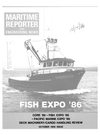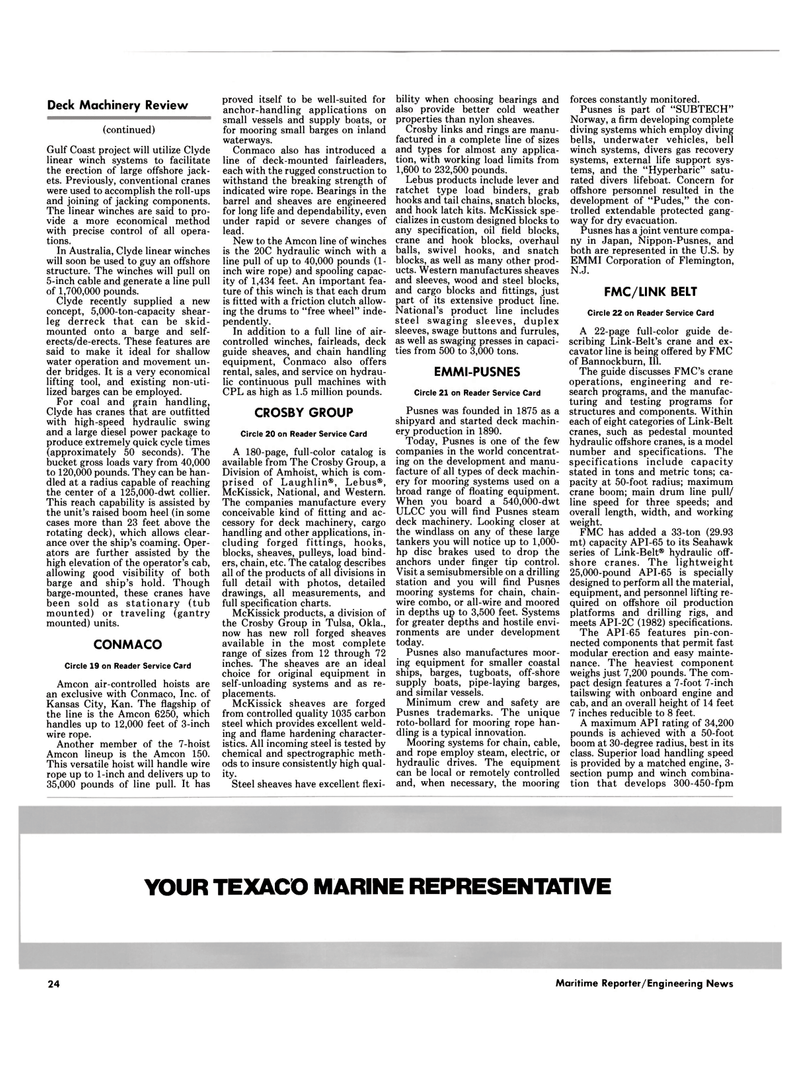
Page 22: of Maritime Reporter Magazine (October 1986)
Read this page in Pdf, Flash or Html5 edition of October 1986 Maritime Reporter Magazine
Deck Machinery Review (continued)
Gulf Coast project will utilize Clyde linear winch systems to facilitate the erection of large offshore jack- ets. Previously, conventional cranes were used to accomplish the roll-ups and joining of jacking components.
The linear winches are said to pro- vide a more economical method with precise control of all opera- tions.
In Australia, Clyde linear winches will soon be used to guy an offshore structure. The winches will pull on 5-inch cable and generate a line pull of 1,700,000 pounds.
Clyde recently supplied a new concept, 5,000-ton-capacity shear- leg derreck that can be skid- mounted onto a barge and self- erects/de-erects. These features are said to make it ideal for shallow water operation and movement un- der bridges. It is a very economical lifting tool, and existing non-uti- lized barges can be employed.
For coal and grain handling,
Clyde has cranes that are outfitted with high-speed hydraulic swing and a large diesel power package to produce extremely quick cycle times (approximately 50 seconds). The bucket gross loads vary from 40,000 to 120,000 pounds. They can be han- dled at a radius capable of reaching the center of a 125,000-dwt collier.
This reach capability is assisted by the unit's raised boom heel (in some cases more than 23 feet above the rotating deck), which allows clear- ance over the ship's coaming. Oper- ators are further assisted by the high elevation of the operator's cab, allowing good visibility of both barge and ship's hold. Though barge-mounted, these cranes have been sold as stationary (tub mounted) or traveling (gantry mounted) units.
CONMACO
Circle 19 on Reader Service Card
Amcon air-controlled hoists are an exclusive with Conmaco, Inc. of
Kansas City, Kan. The flagship of the line is the Amcon 6250, which handles up to 12,000 feet of 3-inch wire rope.
Another member of the 7-hoist
Amcon lineup is the Amcon 150.
This versatile hoist will handle wire rope up to 1-inch and delivers up to 35,000 pounds of line pull. It has proved itself to be well-suited for anchor-handling applications on small vessels and supply boats, or for mooring small barges on inland waterways.
Conmaco also has introduced a line of deck-mounted fairleaders, each with the rugged construction to withstand the breaking strength of indicated wire rope. Bearings in the barrel and sheaves are engineered for long life and dependability, even under rapid or severe changes of lead.
New to the Amcon line of winches is the 20C hydraulic winch with a line pull of up to 40,000 pounds (1- inch wire rope) and spooling capac- ity of 1,434 feet. An important fea- ture of this winch is that each drum is fitted with a friction clutch allow- ing the drums to "free wheel" inde- pendently.
In addition to a full line of air- controlled winches, fairleads, deck guide sheaves, and chain handling equipment, Conmaco also offers rental, sales, and service on hydrau- lic continuous pull machines with
CPL as high as 1.5 million pounds.
CROSBY GROUP
Circle 20 on Reader Service Card
A 180-page, full-color catalog is available from The Crosby Group, a
Division of Amhoist, which is com- prised of Laughlin®, Lebus®,
McKissick, National, and Western.
The companies manufacture every conceivable kind of fitting and ac- cessory for deck machinery, cargo handling and other applications, in- cluding forged fittings, hooks, blocks, sheaves, pulleys, load bind- ers, chain, etc. The catalog describes all of the products of all divisions in full detail with photos, detailed drawings, all measurements, and full specification charts.
McKissick products, a division of the Crosby Group in Tulsa, Okla., now has new roll forged sheaves available in the most complete range of sizes from 12 through 72 inches. The sheaves are an ideal choice for original equipment in self-unloading systems and as re- placements.
McKissick sheaves are forged from controlled quality 1035 carbon steel which provides excellent weld- ing and flame hardening character- istics. All incoming steel is tested by chemical and spectrographic meth- ods to insure consistently high qual- ity.
Steel sheaves have excellent flexi- bility when choosing bearings and also provide better cold weather properties than nylon sheaves.
Crosby links and rings are manu- factured in a complete line of sizes and types for almost any applica- tion, with working load limits from 1,600 to 232,500 pounds.
Lebus products include lever and ratchet type load binders, grab hooks and tail chains, snatch blocks, and hook latch kits. McKissick spe- cializes in custom designed blocks to any specification, oil field blocks, crane and hook blocks, overhaul balls, swivel hooks, and snatch blocks, as well as many other prod- ucts. Western manufactures sheaves and sleeves, wood and steel blocks, and cargo blocks and fittings, just part of its extensive product line.
National's product line includes steel swaging sleeves, duplex sleeves, swage buttons and furrules, as well as swaging presses in capaci- ties from 500 to 3,000 tons.
EMMI-PUSNES
Circle 21 on Reader Service Card
Pusnes was founded in 1875 as a shipyard and started deck machin- ery production in 1890.
Today, Pusnes is one of the few companies in the world concentrat- ing on the development and manu- facture of all types of deck machin- ery for mooring systems used on a broad range of floating equipment.
When you board a 540,000-dwt
ULCC you will find Pusnes steam deck machinery. Looking closer at the windlass on any of these large tankers you will notice up to 1,000- hp disc brakes used to drop the anchors under finger tip control.
Visit a semisubmersible on a drilling station and you will find Pusnes mooring systems for chain, chain- wire combo, or all-wire and moored in depths up to 3,500 feet. Systems for greater depths and hostile envi- ronments are under development today.
Pusnes also manufactures moor- ing equipment for smaller coastal ships, barges, tugboats, off-shore supply boats, pipe-laying barges, and similar vessels.
Minimum crew and safety are
Pusnes trademarks. The unique roto-bollard for mooring rope han- dling is a typical innovation.
Mooring systems for chain, cable, and rope employ steam, electric, or hydraulic drives. The equipment can be local or remotely controlled and, when necessary, the mooring forces constantly monitored.
Pusnes is part of "SUBTECH"
Norway, a firm developing complete diving systems which employ diving bells, underwater vehicles, bell winch systems, divers gas recovery systems, external life support sys- tems, and the "Hyperbaric" satu- rated divers lifeboat. Concern for offshore personnel resulted in the development of "Pudes," the con- trolled extendable protected gang- way for dry evacuation.
Pusnes has a joint venture compa- ny in Japan, Nippon-Pusnes, and both are represented in the U.S. by
EMMI Corporation of Flemington,
N.J.
FMC/LINK BELT
Circle 22 on Reader Service Card
A 22-page full-color guide de- scribing Link-Belt's crane and ex- cavator line is being offered by FMC of Bannockburn, 111.
The guide discusses FMC's crane operations, engineering and re- search programs, and the manufac- turing and testing programs for structures and components. Within each of eight categories of Link-Belt cranes, such as pedestal mounted hydraulic offshore cranes, is a model number and specifications. The specifications include capacity stated in tons and metric tons; ca- pacity at 50-foot radius; maximum crane boom; main drum line pull/ line speed for three speeds; and overall length, width, and working weight.
FMC has added a 33-ton (29.93 mt) capacity API-65 to its Seahawk series of Link-Belt® hydraulic off- shore cranes. The lightweight 25,000-pound API-65 is specially designed to perform all the material, equipment, and personnel lifting re- quired on offshore oil production platforms and drilling rigs, and meets API-2C (1982) specifications.
The API-65 features pin-con- nected components that permit fast modular erection and easy mainte- nance. The heaviest component weighs just 7,200 pounds. The com- pact design features a 7-foot 7-inch tailswing with onboard engine and cab, and an overall height of 14 feet 7 inches reducible to 8 feet.
A maximum API rating of 34,200 pounds is achieved with a 50-foot boom at 30-degree radius, best in its class. Superior load handling speed is provided by a matched engine, 3- section pump and winch combina- tion that develops 300-450-fpm
YOUR TEXACO MARINE REPRESENTATIVE 24 Maritime Reporter/Engineering News

 21
21

 23
23
